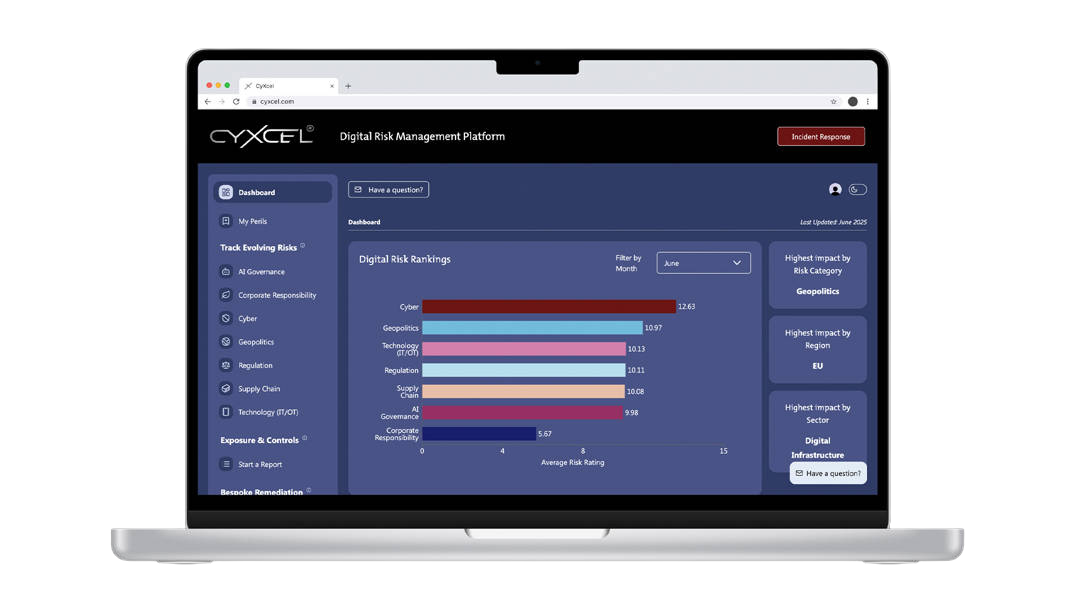Navigating the Impact of Influence Operations on Business


Digitization has fundamentally transformed the global information ecosystem. Traditional news sources, such as television and print as well as established news websites are experiencing declining engagement as consumption patterns shift toward social media and messaging platforms.
Written by: Samuel Kudláč, Senior Analyst
Changing Consumption Patterns
According to the Reuters 2025 Digital News Report, platforms such as X, YouTube, Instagram, TikTok and WhatsApp are becoming primary sources of news for one third of the surveyed population, compared to just a decade ago. Video-format news consumption has also grown substantially, to 75% in 2025 from 67% in 2020.
Worryingly, the platforms most associated with the spreading of misinformation, TikTok, X, and Facebook, are among the fastest growing sources of news consumption worldwide.
This shift has exposed the public to both domestic and foreign influence operations that exploit social media's amplification mechanisms to spread malicious narratives at unprecedented scale and speed. This is primarily caused by the prioritization of engagement over accuracy by social media algorithms, which create ideal 'echo chamber-like' conditions for influence operations to flourish. Efforts by the likes of Meta to moderate the content and introduce fact-checking have been repeatedly found to be too little, too late.

Financial, Reputational and Democratic Impact
Influence operations are political instruments that blend cyber capabilities and geopolitical strategy to shape narratives and public opinion within and beyond national boundaries. As the use of social media and messaging platforms grows, nation-states and non-state actors increasingly exploit them for adversarial political objectives, such as amplifying societal divides and undermining trust in democratic institutions. These campaigns are especially effective during moments of high socio-political uncertainty, with artificial intelligence (AI) dramatically amplifying their scale, speed and sophistication.
The impact of influence operations extends far beyond elections and the political process. They pose major financial and reputational threats to businesses of all sizes. Influence narratives can trigger immediate market consequences, like when the fake Associated Press tweet about White House explosions erased over USD 136 billion from the S&P 500 in just three minutes.
Indeed, according to the World Economic Forum data, disinformation is now estimated to cost USD 39 billion annually in stock market losses and USD 17 billion in poor financial decisions, while fake reviews alone account for USD 152 billion in global business losses. Given that disinformation spreads 70% faster than verified information on social media, reputational damage is a major concern for most executives. Yet organizations often lack adequate preparations to identify and manage these threats.
Parliamentary Elections in Czechia and Moldova
The October 2025 parliamentary elections in Czechia, highlighted the sheer scale and sophistication of modern influence operations. In the weeks preceding the vote, approximately 16 state-linked disinformation and conspiracy theory websites generated more content than all traditional Czech media outlets combined. Nearly 300 coordinated TikTok accounts systematically promoted narratives favorable to external actors, including Russia, generating up to 9 million views weekly and exceeding the combined digital reach of mainstream party leaders.
These accounts operated through layered structures, with core content creators supported by networks of amplification profiles using automated engagement tactics to push content into users' feeds within seconds of posting. The operation targeted younger audiences, creating an artificial impression of grassroots support for populist and far-right candidates, similar to the campaign targeting Romania's presidential election in late 2024. The objective was to destabilize Czech support for Ukraine, polarize NATO's eastern flank and undermine societal cohesion in a nation vocally supportive of resistance to Russian aggression.
Moldova’s parliamentary elections in September also showed worrying levels of disinformation and foreign interference, especially as they proved pivotal for the country’s European integration ambitions.
Coordinated influence operations attributed to Russian propaganda actors Matryoshka and Storm-1516 were launched as early as April 2025, producing AI-generated content impersonating legitimate media outlets and government officials across popular social media platforms. The operations featured synthetic videos portraying Parliament leader Igor Grosu referring to Moldovan citizens as a "flock of sheep" and election workers falsely claiming authorities were forging ballots.
Despite the eventual electoral defeat of Moldova's pro-Russian opposition, much like in Czechia, this campaign showed a persistent strategic focus on eroding institutional trust, societal cohesion and creating uncertainty about the country's European integration trajectory.
Broader Patterns from 2024 Elections
The 2025 interference campaigns build upon patterns observed throughout 2024, when multiple nation-state actors from countries that included China, Russia and Iran increased their efforts to influence election cycles through fabricated video content and automated social media campaigns damaging candidate reputations and amplifying divisive narratives.
These campaigns rapidly adapted following detection, shifting to new platforms and techniques to maintain operational tempo. Beyond direct electoral interference, influence operations increasingly leveraged seemingly independent media outlets and paid influencer networks to spread disinformation, showcasing the evolving complexity of the modern information landscape.
Linking these trends to the previously described case studies, Czechia, despite not holding elections in 2024, became a prominent target of Russian influence operations aimed at undermining public confidence in democratic institutions and weakening support for Ukraine. These operations employed the Doppelganger network, creating fraudulent websites impersonating legitimate Czech and international media outlets to disseminate anti-European and pro-authoritarian narratives. The operation combined botnet activity with inauthentic social media accounts to spread content tailored to exploit Czech cultural and political contexts while coordinating with broader destabilization efforts across Central Europe.
In October 2024, Moldova simultaneously held a first round of presidential elections and a referendum on embedding EU membership aspirations in its constitution. Russia engaged in a multi-layered attempt to undermine Moldova's democratic processes and divert the nation from its EU trajectory by combining sophisticated influence operations with physical sabotage and financial support for anti-European political factions.

Source: EUISS
Widespread availability of affordable yet powerful AI tools, and the inability of popular social media platforms to combat false narratives at a meaningful scale, have rendered existing countermeasures increasingly inadequate.
The 2025 election cycles in Czechia and Moldova reveal exactly how AI-generated deepfake content and synthetic media now outpace legacy response methods. This type of content would have been easily recognized as fake just a few years ago. Today, disinformation is substantially more difficult to detect, especially given the latest advances in sophistication and accessibility of generative AI technologies.
Building Resilience Through Preparedness
Protecting against influence operations and disinformation requires a multi-layered approach combining early detection, crisis preparedness and collaborative action:
- Comprehensive media literacy education builds sustainable resilience by improving the ability to identify misleading narratives, verify source credibility and resist manipulation techniques.
- Communication drills and crisis simulations ensure teams are prepared to respond to threats in real time.
- Engagement with journalists, influencers and public figures can help neutralize influence operations early on.

Assess Your Organization’s Exposure
Evaluate your preparedness against disinformation and influence operations by leveraging CyXcel’s Digital Risk Management platform; it provides the resources you need to assess your exposure and strengthen your defenses.
The tool will guide you through a rigorous risk evaluation and management process, so you can win, build and retain trust. Some of the key issues covered are as follows:
Crisis Preparedness and Response
- Do you conduct scenario planning exercises or tabletop simulations, ideally with external experts, to help measure and manage the impact of an adverse geopolitical event on your organization?
- Is your marketing/communications/PR function prepared for countering any potential foreign influence campaigns against your company, services, products or people via online forums such as social media?
- Do you have a robust government and public-affairs function to communicate your company's value proposition and identity to key stakeholders in the event of a geopolitical crisis that affects your regional operations differently?
Strategic Alignment and Positioning
- Is there Board and C-suite level alignment on the benefits and risks of maintaining a 'neutral' stance on socio-political issues (such as the Gaza war or the development of dual-use technology for both civilian and military use) that may divide your staff, regional operations or customers?
AI-Specific Risk Management
If your organization uses artificial intelligence in business operations, consider:
- Do you proactively track and manage AI-related cyber risks to your organization such as AI-generated malware, AI-generated phishing or AI-generated disinformation?
- Do you actively help inform policy debates about the systemic or society-wide impacts of AI that could undercut socio-political cohesion or destabilize labor markets?
How We Can Help
As technological innovation continues to surpass practically all methods of legacy engagement with information, continuous vigilance has become a necessity, and trust is a strategic competitive asset rather than a luxury for businesses.
CyXcel helps organizations navigate this complex disinformation landscape through comprehensive monitoring, risk assessments, intelligence and preparedness services. Our team continuously monitors geopolitical developments and cyber threats that could trigger or amplify influence operations, delivering timely threat intelligence and mitigation advice that enables clients to anticipate and prepare for false narratives before they emerge.
Through tailored training programs, we build organizational capacity to recognize and report influence operations and disinformation threats. Our crisis simulations test response plans under specific scenarios, ensuring leadership teams and communications staff are prepared to act decisively when false narratives threaten business operations, reputation or market value.
If you would like to find out more about how CyXcel can assist you in navigating emerging disinformation and cyber risks, please contact us here or at info@cyXcel.com.
Photos by Sasha Pleshco and Kazuo Ota on Unsplash.
